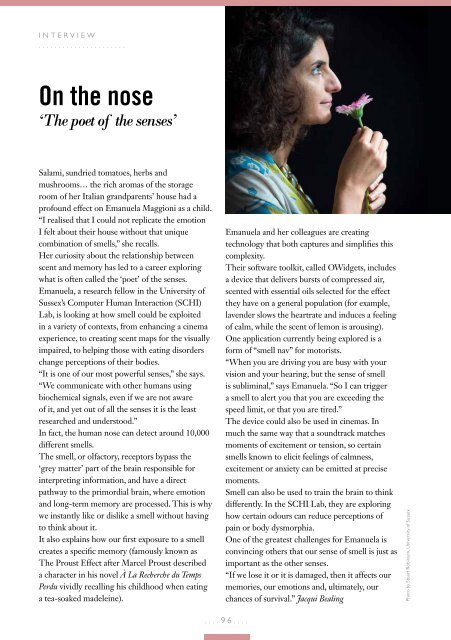Viva Brighton Issue #68 October 2018
Create successful ePaper yourself
Turn your PDF publications into a flip-book with our unique Google optimized e-Paper software.
INTERVIEW<br />
......................<br />
On the nose<br />
‘The poet of the senses’<br />
Salami, sundried tomatoes, herbs and<br />
mushrooms… the rich aromas of the storage<br />
room of her Italian grandparents’ house had a<br />
profound effect on Emanuela Maggioni as a child.<br />
“I realised that I could not replicate the emotion<br />
I felt about their house without that unique<br />
combination of smells,” she recalls.<br />
Her curiosity about the relationship between<br />
scent and memory has led to a career exploring<br />
what is often called the ‘poet’ of the senses.<br />
Emanuela, a research fellow in the University of<br />
Sussex’s Computer Human Interaction (SCHI)<br />
Lab, is looking at how smell could be exploited<br />
in a variety of contexts, from enhancing a cinema<br />
experience, to creating scent maps for the visually<br />
impaired, to helping those with eating disorders<br />
change perceptions of their bodies.<br />
“It is one of our most powerful senses,” she says.<br />
“We communicate with other humans using<br />
biochemical signals, even if we are not aware<br />
of it, and yet out of all the senses it is the least<br />
researched and understood.”<br />
In fact, the human nose can detect around 10,000<br />
different smells.<br />
The smell, or olfactory, receptors bypass the<br />
‘grey matter’ part of the brain responsible for<br />
interpreting information, and have a direct<br />
pathway to the primordial brain, where emotion<br />
and long-term memory are processed. This is why<br />
we instantly like or dislike a smell without having<br />
to think about it.<br />
It also explains how our first exposure to a smell<br />
creates a specific memory (famously known as<br />
The Proust Effect after Marcel Proust described<br />
a character in his novel À La Recherche du Temps<br />
Perdu vividly recalling his childhood when eating<br />
a tea-soaked madeleine).<br />
Emanuela and her colleagues are creating<br />
technology that both captures and simplifies this<br />
complexity.<br />
Their software toolkit, called OWidgets, includes<br />
a device that delivers bursts of compressed air,<br />
scented with essential oils selected for the effect<br />
they have on a general population (for example,<br />
lavender slows the heartrate and induces a feeling<br />
of calm, while the scent of lemon is arousing).<br />
One application currently being explored is a<br />
form of “smell nav” for motorists.<br />
“When you are driving you are busy with your<br />
vision and your hearing, but the sense of smell<br />
is subliminal,” says Emanuela. “So I can trigger<br />
a smell to alert you that you are exceeding the<br />
speed limit, or that you are tired.”<br />
The device could also be used in cinemas. In<br />
much the same way that a soundtrack matches<br />
moments of excitement or tension, so certain<br />
smells known to elicit feelings of calmness,<br />
excitement or anxiety can be emitted at precise<br />
moments.<br />
Smell can also be used to train the brain to think<br />
differently. In the SCHI Lab, they are exploring<br />
how certain odours can reduce perceptions of<br />
pain or body dysmorphia.<br />
One of the greatest challenges for Emanuela is<br />
convincing others that our sense of smell is just as<br />
important as the other senses.<br />
“If we lose it or it is damaged, then it affects our<br />
memories, our emotions and, ultimately, our<br />
chances of survival.” Jacqui Bealing<br />
Photo by Stuart Robinson, University of Sussex<br />
....96....


















